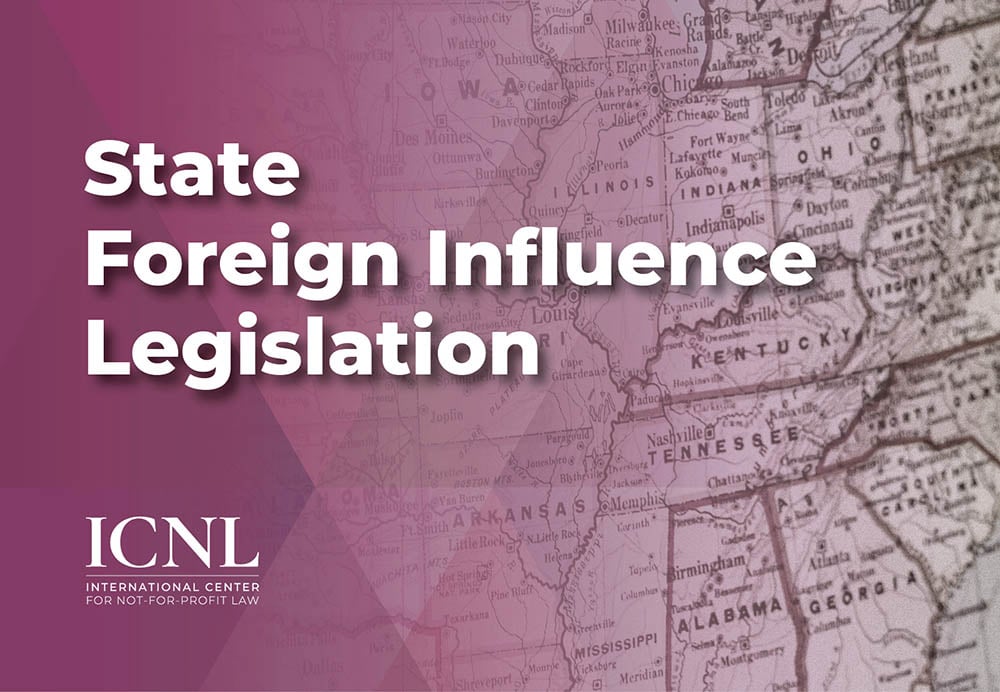State Foreign Influence Legislation
A number of US states have introduced or enacted either foreign influence registration laws that impact nonprofits or new restrictions on charitable solicitation based on foreign influence. This tracker follows such state bills introduced since 2024. To learn more about the constitutional and policy concerns raised by this legislation read this ICNL analysis. To learn more about the Foreign Agents Registration Act (FARA), upon which this state legislation is frequently modeled, visit ICNL’s FARA page.

Jump to:
Enacted Legislation

Nebraska LB 644 (2025)
Enacted: June 4, 2025
Requires anyone who is an agent of a foreign principal from an “adversary nation” or “foreign terrorist organization” to register with the Nebraska State Attorney General if they are engaged in covered activities. A foreign principal includes a foreign government, company, organization, an organization at least 20% owned by a foreign entity, or person outside the United States (unless they are a domiciled U.S. resident). Adversary nation is defined to be those designated by the federal government under 15 C.F.R. 791.4 (China, Cuba, Iran, North Korea, Russia, and Maduro Regime) and foreign terrorist organization is defined as those designated by the U.S State Department under 8 U.S.C. 1189. It nearly verbatim copies FARA’s agency definition, including if one acts at the “order or request” of a foreign principal.
The covered activities in this Act are almost identical to FARA, such as engaging in political activities, soliciting or disbursing things of value, or acting as a publicity agent for or in the interests of a foreign principal. It does not contain many of the exemptions in FARA, including for commercial, religious, academic, or humanitarian activity. It also has extensive reporting and labeling requirements for those who register. Failure to register is punishable by up to a $50,000 civil fine and the Attorney General can apply to a District Court to enjoin an unregistered action or mandate compliance.
Any student or employee of a postsecondary educational institution found to be violation of the Act shall be expelled or dismissed and each postsecondary educational institution in Nebraska must adopt a policy to enforce this. Any alien found in violation of the Act shall be subject to referral to the Justice Department for removal. “All businesses and nonprofit organizations operating within the State of Nebraska shall attest that they are cognizant of and in compliance” with this Act. The schedule of attestation varies by entity, but is either annual or on a biennial basis. Any covered agent under the Act cannot subcontract for services covered under the Act without informing all parties of their status as an agent. The Act also provides the Attorney General civil investigative demand authority where they have “reasonable cause” to believe any person is not in compliance with the Act.

Arkansas HB 1800 (2025)
Enacted: April 22, 2025
Requires any “representative of a hostile foreign principal” to register with the Arkansas Secretary of State and provide information on one’s activities.
A “hostile foreign principal” is defined as a government or political party of a hostile foreign nation, a nonresident alien of a hostile foreign nation, or a partnership, association, corporation, or organization organized under the law of or having its principal place of business in a hostile foreign nation. A hostile foreign nation is defined as China, Russia, North Korea, or Iran. To be a representative of a hostile foreign nation one must act as an agent, representative, or otherwise at the request or under the direction or control of a hostile foreign principal; have one’s actions financed in whole or in part by a hostile foreign principal; and engage in political activity. “Political activity” is defined as activity performed to influence an agency or public official in Arkansas or the public of Arkansas with reference to formulating or adopting policies in the state or electing or opposing a candidate for local or state public office.
The Act also requires a “foreign-supported political organization” register under the Act and provide information about its activities. A foreign-supported political organization is defined as a political party, association, corporation, organization, or any other combination of persons who within the last five years received money or things of value from a hostile foreign principal or a representative of a hostile foreign principal and that engages in “political activity” (there is no de minimis exemption).
Any violation of the Act can lead up to a $500 fine. If the violation is willful or repeated then the fine is up to $2,000 per violation.

Florida SB 700 (2025)
Enacted: May 15, 2025
Bans nonprofits that solicit funds in the state of Florida from soliciting or accepting “contributions or anything of value from a foreign source of concern.”
A “foreign source of concern” is defined as a government or official of a country of concern; a political party or member of a political party of a country of concern; an organization or company organized under the laws or having its principal place of business in a country of concern; a person domiciled in a foreign country of concern who is not a citizen of the U.S.; an agent acting on behalf of a foreign source of concern; or an entity in which a source of concern has a “controlling interest” (which includes a company more than 25% owned by a foreign source of concern). A “country of concern” is defined as China, Russia, Iran, North Korea, Cuba, Venezuela (under Nicolas Maduro), or Syria.
Violation of this ban can lead to a range of penalties including a cease and desist order, fines of up to $10,000, or suspension or cancellation of the nonprofit’s registration for charitable solicitation in the state (barring them from fundraising in Florida). However, if it is a first offense no punitive action will occur if the nonprofit provides an attestation where the foreign source falsely claimed that they are not actually a foreign source of concern; proof that the nonprofit refunded the money from this source; and a plan of action to ensure that the nonprofit does not accept contributions from foreign sources of concern in the future. There is an exemption for religious and educational institutions, charities that limit solicitation to their members, chapters of veteran services organizations, and organizations that receive less than $50,000 a year in contributions if the solicitation is carried out by volunteers. Organizations soliciting funding must annually attest they are in compliance with this law through a process that will be created by the the Florida Department of Agriculture and Consumer Services.
The bill also creates an “Honest Services Registry” which will list nonprofits that attest that the nonprofit does not accept contributions or services from a foreign source of concern and that “the organization’s messaging and content are not directly or indirectly produced or influenced by a foreign source of concern.”
Pending Legislation

New York A 1302 (2025)
Status: Introduced Jan. 9, 2025
Prohibits a person who has ever been a “foreign agent” from holding civil office. “Foreign agent” is defined as a “person who acts at the order, request, or under the direction or control of a foreign organization or person outside of the United States or are controlled or subsidized in major part by a foreign government, organization, or person outside the United States.”

Missouri HB 1351 (2025)
Introduced: Feb. 18, 2025
Would require anyone who is an agent of a foreign principal from an “adversary nation” or “foreign terrorist organization” to register with the Missouri State Attorney General. A foreign principal includes a foreign government, company, organization, individual, an organization at least 20% owned by a foreign entity, or a foreign terrorist organization. Adversary nation is defined to be those designated by the federal government under 15 C.F.R. 791.4 (China, Cuba, Iran, North Korea, Russia, and Maduro Regime) and foreign terrorist organization is defines as those designated by the U.S State Department under 8 U.S.C. 1189. It nearly verbatim copies FARA’s agency definition, including if one acts at the “request” of a foreign principal. The covered activities are almost identical to FARA, such as engaging in political activities, soliciting or disbursing things of value, or acting as a publicity agent. It does not contain most of the exemptions in FARA, including for commercial, religious, academic, or humanitarian activity. It also has extensive labeling requirements for those who register.
Failure to register is punishable by up to a $100,000 fine and can enjoined by the Attorney General if it involves ongoing activity. Any student or employee of a postsecondary educational institution found to be violation shall be expelled or dismissed. Any alien found in violation of the Act shall be subject to referral to the Justice Department for removal. “All active businesses and nonprofits operating within the state of Missouri shall attest on a filing form that they are cognizant of and in compliance” with this Act.

Illinois SB 2371 (2025)
Introduced: Feb. 7, 2025
Would require an agent of a foreign principal from a country of concern to register with the Attorney General of Illinois. Country of concern is defined to mean China, Russia, Iran, North Korea, Cuba, Syria, Venezuela, or any other entity designated by the Governor of Illinois. It nearly verbatim copies FARA’s agency definition, including if one acts at the “request” of a foreign principal. The covered activities are almost identical to FARA, such as engaging in political activities, soliciting or disbursing things of value, or acting as a publicity agent. It does not contain most of the exemptions in FARA, including for commercial, religious, academic, or humanitarian activity.
Failure to register or misrepresentation in registration is a class 3 felony, punishable by 5 to 10 years in jail and a $100,000.
Defeated, Withdrawn, or Expired Legislation

Florida S 766 / HB 583 (2025)
Status: Passed House
Would require anyone who is an “agent of a foreign principal” to register with and provide detailed information to the Florida Division of Elections. An “agent of a foreign principal” is defined as anyone who engages in “political activity” who is an employee or representative of a foreign principal or acts at their direction or “request” or is financed in whole or in part by such principal. “Foreign principal” includes a foreign government, foreign company or nonprofit, a person domiciled outside the U.S, or a company or association at least 20% beneficially owned by those outside the U.S. “Political activity” is defined to include influencing any public official, influencing the public to change any laws or policies, or to “support or oppose any issue.”
All “foreign supported political organization[s]” must also register, which is any organization or other combination of persons who in the past five years received money or things of value from a foreign principal or an “agent of a foreign principal” and engages in political activity.
Any failure to register will result in a fine of $500 per infraction or for willful or repeated violations a fine of up to $2,000. If the foreign principal is a “hostile foreign principal” (defined as anyone who is a foreign principal because of China, Iran, North Korea, or Russia) then the fine is up to $10,000.

Indiana HB 1032 (2025)
Status: Passed House
Would require anyone who is an agent of a foreign principal from a “country of concern” to register with the Indiana State Attorney General. A foreign principal includes a foreign government, company, organization, or individual. Country of concern is defined to be Burma, China, Cuba, Eritrea, Iran, Nicaragua, Pakistan, Saudi Arabia, Turkmenistan, and other countries. It nearly verbatim copies FARA’s agency definition, including if one acts at the “request” of a foreign principal. The covered activities are almost identical to FARA, such as engaging in political activities, soliciting or disbursing things of value, or acting as a publicity agent. It does not contain most of the exemptions in FARA, including for commercial, religious, academic, or humanitarian activity. It also has extensive labeling requirements for those who register. Failure to register is punishable by a $100,000 fine or 2.5 years imprisonment.

Georgia SB 177 (2025)
Status: Passed Senate
Requires an “agent of a hostile foreign principal” or “foreign supported political organization” to register with the state ethics commission. An “agent of a hostile foreign principal” is any person who acts as an agent, employee, or acts at the direction or request of a hostile foreign principal and whose actions are financed in whole or in part by a foreign principal and who engages in political activity. A “foreign supported political organization” means any organization, association, or other combination of persons that has within the past five years received money or other things of value from a hostile foreign principal or agent of a hostile foreign principal and engages in political activities. A “hostile foreign principal means” the government of a hostile foreign country (defined as North Korea, Iran, China, or Russia); a nonresident alien of a hostile foreign country; an association or company based in a hostile foreign country; or a company or other entity that is 20% or more beneficially owned by a hostile foreign government or an entity or nonresident alien from such a country. Political activity is defined as any activity performed to influence any public official in Georgia or the public in reference to changing its laws and policies or an election.
A violation of this law can lead to civil penalties by the Commission of up to $10,000. Willful or repeat violations should lead to civil penalties of at least $10,000 and up to $200,000. The Attorney General may also seek a temporary restraining order, civil penalties, or “initiate a criminal investigation.”

Oklahoma SB 960 (2025)
Status: Introduced Feb. 2, 2025
Would require anyone who is an agent of a foreign principal from a “country of concern” to register with the Oklahoma State Attorney General. A foreign principal includes a foreign government, company, organization, or individual. Country of concern is defined to be any country designated by the U.S. Secretary of State as “hostile” or a country of concern, which currently includes China, Pakistan, Nicaragua, North Korea, and several other countries. It nearly verbatim copies FARA’s agency definition, including if one acts at the “request” of a foreign principal. The covered activities are almost identical to FARA, such as engaging in political activities, soliciting or disbursing things of value, or acting as a publicity agent. It does not contain most of the exemptions in FARA, including for commercial, religious, academic, or humanitarian activity. It also has extensive labeling requirements for those who register. Failure to register is punishable by a $1,000 fine or 5 years imprisonment.

Tennessee SB 317 (2025)
Introduced: Jan. 27, 2025
Would require anyone who is an “agent of a hostile foreign principal” to register with and provide detailed information to the Tennessee ethics commission. An “agent of a hostile foreign principal” is defined as anyone who engages in “political activity” who is an employee or representative of a hostile foreign principal or acts at their direction or “request” or is financed in whole or in part by such principal. “Political activity” is defined to include any activity performed to influence an agency or public official within the state with reference to formulating, adopting, or changing policies of the state or electing or opposing a candidate for public office. The law does not require that that the hostile foreign principal undertake a direction or request in relation to the “political activity”. “Hostile foreign nation” is defined to be China, Russia, North Korea, and Iran. All “foreign supported political organization[s]” must also register, which is any organization or other combination of persons who in the past five years received money or things of value from a hostile foreign principal or an “agent of a hostile foreign principal” and engages in political activity.
Any failure to register will result in a fine of $500 per infraction or for willful or repeated violations a fine of up to $10,000 or disbarment if an attorney. The commission may refer any matter to the Tennessee Attorney General for civil or criminal action.

Florida S 912 (2025)
Status: Introduced Feb. 19, 2025. Withdrawn from consideration on May 3, 2025
Would require anyone who is an agent of a foreign principal from an adversarial nation or foreign terrorist organization engaged in covered activities to register with and provide detailed information to the Florida Attorney General. The bill nearly verbatim copies FARA’s agency definition, including if one acts at the “request” of a foreign principal. Covered activities also copies from FARA, including broadly defined political activities, acting as a publicity agent or political consultant, or collecting or disbursing anything of value. Foreign principal includes a foreign government, foreign company or nonprofit, a person domiciled outside the U.S, a company or association at least 20% beneficially owned by those outside the U.S., or a foreign terrorist organization. Adversarial nation is defined to be any nation in 15 8.232 C.F.R. 7.4(a) (China, Cuba, Iran, North Korea, Russia, and Maduro regime). Foreign terrorist organization means any organization on the U.S. State Department’s list of Designated Foreign Terrorist Organizations.The bill does not include many of the exemptions in FARA, including the commercial exemption.
It is a third degree felony to wilfully violate the statute punishable by up to 5 years in jail or alternatively up to a $100,000 fine. Anyone who is a student, staff, or faculty member of the Florida state university system must be expelled or dismissed upon conviction. Any alien who violates this bill would be referred to the federal government for deportation.

West Virginia HB 5043 (2023)
Status: Passed House on Feb. 23, 2024; introduced in Senate Feb. 29, 2024; expired in committee
Would require an agent of a foreign principal to register with the Secretary of State of West Virginia. Foreign principal is defined to include any foreign government, organization, company, or individual. It nearly verbatim copies FARA’s agency definition, including creating an agency relationship if one acts at the “request” of a foreign principal. It also nearly verbatim copies FARA’s covered activities, such as engaging in political activities, soliciting or disbursing things of value, or acting as a publicity agent. It also closely copies FARA’s exemptions. It copies many of FARA’s disclosure requirements.
Willful failure to register or filing a false statement of material fact is punishable by a $5,000 fine and three months imprisonment on the first offense, a $10,000 fine and 6 months imprisonment on the second offense, and a fine of up to $100,000 and up to 1 year imprisonment.

Arizona HB 2506 (2024)
Status: Passed House on Feb. 26, 2024; introduced in Senate Feb. 29, 2024; expired in committee
Would require the anyone acting as an agent of a foreign principal of a country of concern to register with the state attorney general’s office. Foreign principal is defined to include a foreign government or foreign corporation or association. Country of concern is defined to include China, Cuba, Iran, North Korea, Russia, Saudi Arabia, and Venezuela. It uses an agency definition close to FARA’s, including if one acts at the “request” of a foreign principal. It also includes many of the same covered activities as FARA, such as engaging in political activities, soliciting or dispensing things of value, or acting as a publicity agent. However, it does not define these activities in the bill, creating potential confusing. It does not contain most of the exemptions in FARA, including for commercial, religious, academic, or humanitarian activity.
Knowing or willful violation of the act is a class 4 felony punishable by up to 3.75 years in jail and a $100,000 fine. Anyone employed or a student at any university (public or private) in the state who violates the act must be expelled or removed.

Oklahoma HB 1150 (2023)
Status: Passed House March 13, 2024 and sent to Senate; expired before passage
Would require anyone who is an agent of a foreign principal from a “country of concern” to register with the Oklahoma State Attorney General. A foreign principal includes a foreign government, company, organization, or individual. Country of concern is defined to be any country designated by the U.S. Secretary of State as “hostile” or a country of concern, which currently includes China, Pakistan, Nicaragua, North Korea, and several other countries. It nearly verbatim copies FARA’s agency definition, including if one acts at the “request” of a foreign principal. The covered activities are almost identical to FARA, such as engaging in political activities, soliciting or disbursing things of value, or acting as a publicity agent. It does not contain most of the exemptions in FARA, including for commercial, religious, academic, or humanitarian activity. It also has extensive labeling requirements for those who register. Failure to register is punishable by a $1,000 fine or 5 years imprisonment.

Tennessee SB 2863 (2024)
Status: Withdrawn
[Amendment] Would require anyone who is an agent of a foreign principal from a country of concern to register with the Tennessee ethics commission. A foreign principal includes a foreign government, company, organization, or individual. Country of concern is defined to mean China, Russia, Iran, North Korea, Cuba, Syria, Venezuela, or any other country determined to be a foreign adversary by the federal government. It nearly verbatim copies FARA’s agency definition, including if one acts at the “request” of a foreign principal. The covered activities are almost identical to FARA, such as engaging in political activities, soliciting or disbursing things of value, or acting as a publicity agent. It does not contain most of the exemptions in FARA, including for commercial, religious, academic, or humanitarian activity. Failure to register is punishable by a $100,000 fine or 5 years in jail.
California SB 1151 (2024)
Status: Passed Senate May 23, 2024; Introduced in Assembly May 24, 2024; expired in committee
Would require anyone acting as an agent of a foreign principal to register with the California Secretary of State. Foreign principal is defined to include any foreign government, organization, company, or individual. It nearly verbatim copies FARA’s agency definition, including creating an agency relationship if one acts at the “request” of a foreign principal. It also includes many of the same covered activities as FARA, such as engaging in political activities, soliciting or disbursing things of value, or acting as a publicity agent. It does not contain most of the exemptions in FARA, including for commercial, religious, academic, or humanitarian activity.

Illinois SB 3542 (2024)
Status: Introduced Feb. 9, 2024; expired before passage
Would require an agent of a foreign principal from a country of concern to register with the Attorney General of Illinois. Country of concern is defined to mean China, Russia, Iran, North Korea, Cuba, Syria, Venezuela, or any other entity designated by the Governor of Illinois. It nearly verbatim copies FARA’s agency definition, including if one acts at the “request” of a foreign principal. The covered activities are almost identical to FARA, such as engaging in political activities, soliciting or disbursing things of value, or acting as a publicity agent. It does not contain most of the exemptions in FARA, including for commercial, religious, academic, or humanitarian activity. Failure to register or misrepresentation in registration is a class 3 felony, punishable by 5 to 10 years in jail and a $100,000.

Georgia SB 368 (2024)
Status: Introduced Jan. 22, 2024; vetoed by Governor
Would require anyone acting as an agent of a foreign principal to register with the Georgia Ethics Commission. Foreign principal is defined to include any foreign government, organization, company, or individual. It nearly verbatim copies FARA’s agency definition, including creating an agency relationship if one acts at the “request” of a foreign principal. It also includes many of the same covered activities as FARA, such as engaging in political activities, soliciting or disbursing things of value, or acting as a publicity agent. However, it does not define these activities in the bill, creating potential confusing. It does not contain most of the exemptions in FARA, including for commercial, religious, academic, or humanitarian activity. Failure to register can lead to civil penalties, while misrepresentations in registration materials can potentially lead to criminal penalties.
For more information contact Nick Robinson at nrobinson@icnl.org.
Sign up for our newsletters
Sign up


